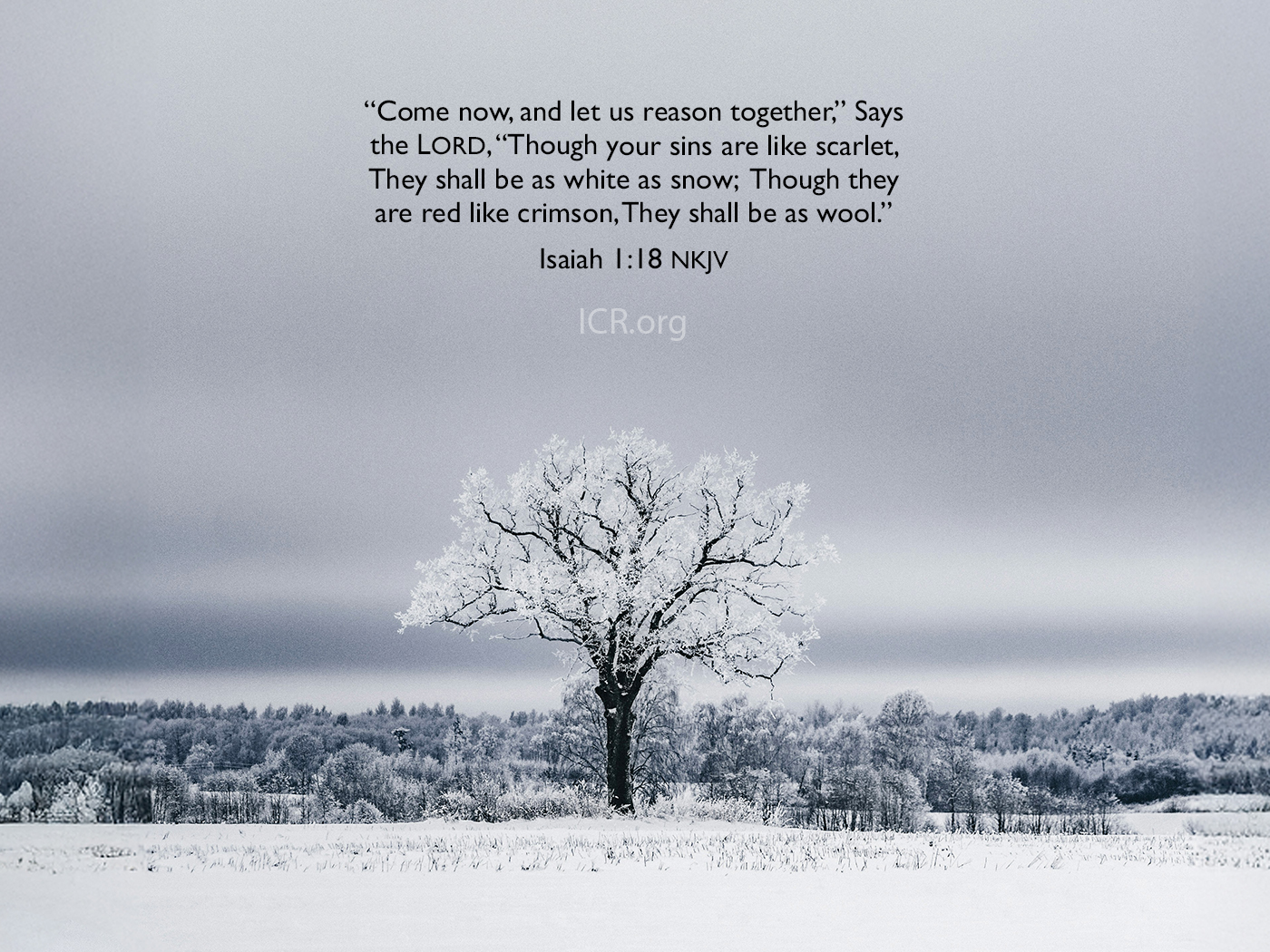Then I saw another angel flying in the midst of heaven, having the everlasting gospel to preach to those who dwell on the earth—to every nation, tribe, tongue, and people—saying with a loud voice, “Fear God and give glory to Him, for the hour of His judgment has come; and worship Him who made heaven and earth, the sea and springs of water.” (Revelation 14:6-7)
There’s a growing trend among evangelical Christians insisting that the Bible does not demand a recent creation—certainly not the creation in six literal days that the Institute for Creation Research declares to be true. In fact, one of the more frequent accusations we receive from some who insist they are evangelicals is that ICR is actually hindering evangelism by maintaining a position that has supposedly been proven by “all of science” to be false.
But science has not proven recent creation to be false. A majority of scientists, it is true, do continue to deny the science that demonstrates the accuracy and validity of Scripture. ICR has documented enormous amounts of scientific evidence that confirm the biblical record of a recent creation. The thousands of articles and hundreds of books, booklets, DVDs, and seminar training sessions have provided ample evidence verifying the accuracy of the history recorded in Scripture. And though such evidence may well never convince those who reject the God of creation, the Bible itself should be the convincing argument for those who claim they have been twice-born by the supernatural power of the Creator (Ephesians 4:24).
In addition to the science, there are vital spiritual reasons to be certain that recent creation did indeed happen just as the Bible’s text describes—and that the rejection of that clear message is a most dangerous heresy.
Textual Issues
Scripture clearly presents God as the Creator of all things. Not only is this obvious in the opening of Genesis, but the rest of Scripture is replete with the theme that the timeless God of eternity past created the universe.1
Thus says God the LORD, Who created the heavens and stretched them out, Who spread forth the earth and that which comes from it, Who gives breath to the people on it, and spirit to those who walk on it. (Isaiah 42:5)
In the beginning was the Word, and the Word was with God, and the Word was God. He was in the beginning with God. All things were made through Him, and without Him nothing was made that was made. (John 1:1-3)
The written text does not imply, much less demand, long ages or indeterminable, gradual processes that took eons to complete the world as we know it. Instead, creation was instantaneous as God spoke it.2
By the word of the LORD the heavens were made, and all the host of them by the breath of His mouth….For He spoke, and it was done; He commanded, and it stood fast. (Psalm 33:6, 9)
It has long been the historical position of the Reformation that God’s revealed and written Word cannot be changed or superseded. Sola Scriptura was the battle cry of this revival—“Scripture alone” would be the church’s foundational authority. And God requires an accurate and precise reading of that written Word.3 God’s written Word must not be altered or deconstructed in any way.4
You shall not add to the word which I command you, nor take from it. (Deuteronomy 4:2)
All our deliberations regarding creation essentially flow from how we view Scripture. The higher our regard for the words of the text, the more careful we are with the interpretation of the text. The more we use the other words and passages in Scripture to define and clarify a given text of Scripture, the less we are inclined to allow extra-biblical information to alter the obvious rendering of that text. The further away an interpretation seems to be from the clear reading and face value of a passage, the more likely such an interpretation will be subject to human error and come into conflict with other axioms of God’s Word. Scripture interprets Scripture.
Issues Regarding the Nature of God
Romans 1:20 makes the clear claim that the created things show the “invisible” nature of God—“even His eternal power and Godhead.” The triune Godhead is certainly in view, and not only the Trinity but also the nature of that Godhead. But we need to be reminded that whatever is revealed to us through the created things (the creation) should not contradict what is revealed in the written Word. Rather, the writings clarify the “invisible” things. Human understanding of the nature of the creation should never override the clear written words of the Creator.
The Preeminent Attribute of God Is Holiness
God’s nature is what both drives and limits His revelation of Himself to His creation. If anything in Scripture is consistent within its definition, then the unique holiness of God is clearly stated.5
No one is holy like the LORD, for there is none besides You. (1 Samuel 2:2)
The four living creatures, each having six wings, were full of eyes around and within. And they do not rest day or night, saying: “Holy, holy, holy, Lord God Almighty, Who was and is and is to come!” (Revelation 4:8)
Because of His holiness, God cannot lie (Titus 1:2). Whenever He reveals anything, He must reveal the truth about Himself and His nature.6 This is the crux of all rebellion against God. The Creator God is “the truth” (John 14:6), and the originator of lies is the archenemy, Satan (John 8:44). Even though the lies he uses may contain some truth, they still oppose God’s full truth as it is revealed in His creation and His Word.
Lies oppose the revelation of truth in the created things (universe).
Lies oppose the revelation of truth in the written Word (Scripture).
Lies oppose the revelation of truth in the new creation (salvation).
The Most Obvious Attribute of God Is His Omniscience
The idea that God used any type of evolutionary process to “create” His world contradicts Scripture’s presentation of God as the omniscient Creator. The Bible leaves no doubt that God’s knowledge is clear and immediate, not progressive.7 God knows all there is to know.8 God’s decisions are unchangeable and without confusion.9 God’s specific will and pleasure are always implemented.10
God’s omniscience demands that He create absolutely and only the best “things,” whether at the scale of the universe or the scale of the molecule. He could not and would not experiment. Since He knows, He must do. He could not and would not produce an inferior product. He must create, shape, and make only that which is good. Evolution demands both experimentation with creation and the creation of inferior forms. In evolution, there is no permanent “good.”
The Most Impactful Attribute of God Is His Love
The issue of a recent creation also impacts how we view what is good versus what is evil and how that fits with God’s character. Conversations about good and evil are universal throughout the world, regardless of how the terms are defined. Few people deny evil exists, but there’s plenty of discussion about what it is. Genesis 3 records the events that altered creation—when “death spread to all men” (Romans 5:12) and the whole creation began to “groan and labor” (Romans 8:22). After Adam’s open sin and conscious rebellion (1 Timothy 2:14), all of humanity was separated from their Creator by “trespasses and sins” (Ephesians 2:1). It would take the infinite love of that Creator to make us “reconciled to God through the death of His Son” (Romans 5:10).
If the evolutionary story is true, then untold millions of living creatures died long before Adam sinned and brought about the judgment of death upon all living things.11
Therefore, just as through one man sin entered the world, and death through sin, and thus death spread to all men, because all sinned... (Romans 5:12)
Biblically speaking, death is, in its most succinct form, separation from the life of the Creator. Death has its fruit—the body decays back to the dust of its origin. But death is much more than the cessation of activity. Death is a disconnection, a disharmony, a dislocation from the source. Death severs us from God.
It would not fit the loving nature of God to exploit the senseless death of millions of life forms before passing sentence on Earth because of Adam’s sin. Nor could God use the wasteful and cruel processes of naturalistic evolution to tell us about His invisible nature. When we try to unravel the story of what God did in ages past, we must be sure that we tell the story with God’s holiness, omniscience, and love as the major features.12
But God demonstrates His own love toward us, in that while we were still sinners, Christ died for us (Romans 5:8).
The Substitution of Jesus Christ
A literal interpretation of the opening chapters of Genesis is foundational to the gospel message. In the Bible, physical death is identified as absolutely necessary to accomplish the atonement for sins. The Bible specifically teaches that “without the shedding of blood there is no remission” (Hebrews 9:22). This teaching is woven throughout Scripture. It is the “blood of Jesus Christ His Son [that] cleanses us from all sin” (1 John 1:7).13 How is it possible to separate this formal and demanding requirement from physical death?
There is no question the Bible teaches that it was necessary for Jesus Christ to die physically in order to accomplish the payment for our sins (Hebrews 2:14-18). Jesus participated in flesh and blood because that is what we are made of! He did it so that He could destroy the devil’s power of death. Jesus was obligated to become flesh and blood in order to accomplish reconciliation. This physical offering was done in the flesh, done once, and done with and for eternal consequences (Hebrews 10:12-14). If there were eons of pain, suffering, and death before the rebellion of Adam brought death into the world, then a whole sweep of biblical teaching is thrown into the black hole of allegory. Worst of all, the sacrificial death of our Lord Jesus becomes unnecessary.
Only the Creator Can Conquer Death
The Bible says that death is an intrusion, a punishment for the creatures’ rebellion against their Creator, and that one day there will be a restoration, a reconciliation of all things that will eliminate death. But the Bible also says death must be defeated. The Creator Himself must conquer it.
- The Creator pronounced the sentence of death (Genesis 3:19).
- The Creator will overcome death (1 Corinthians 15:20-26).
- The Creator has life in Himself (John 1:4; John 8:12; John 11:25).
- The Creator must give His life to give us life (John 10:11-28).
- The Creator grants eternal life to all who believe His words (John 12:50).
If death is normal and good, as it must be if God used it to “create” living creatures, then the physical death of Jesus Christ becomes not only unnecessary but meaningless.
How, Then, Should We Interpret Scripture?
Given all that God has done to convey who He is and what He wants us to know, how should we approach His Word? Do we try to foist a “system” on that which God has inspired? Do we, by our scholarship, filter out the life of the Word? Are we, by our fallible science, polluting the pure milk of God’s spiritual food?
How can we, with our fallen minds, understand His holy communication? What method can rightly bring us before His written Word? Can the mind of man privately decide what God’s Word means? What is the correct interpretive process?
May I humbly suggest that the best process is the one with the least human involvement? Surely the God of our salvation knows our limits. Surely the One who has caused His revealed Word to be recorded knows how to communicate with clarity. Given what we know about ourselves and our universe, what more respect and honor can we give to God’s Word than to let it say what it says? Perhaps the best interpretation is the least interpretation.
I will worship toward Your holy temple, and praise Your name, for Your lovingkindness and Your truth; for You have magnified Your word above all Your name. (Psalm 138:2)
References
- See also Isaiah 42:5; Isaiah 45:12; John 1:4-14; Colossians 1:16; Hebrews 1:1-3; Revelation 4:11.
- See also Psalm 148:5; Isaiah 45:12; 2 Corinthians 4:6.
- See also Psalm 19:7-8; Psalm 119:172; Proverbs 30:5-6.
- See also John 10:35; 2 Peter 1:20; Revelation 22:19; 2 Samuel 22:13; Psalm 12:6; Matthew 5:18-19.
- See also Exodus 15:11; Deuteronomy 32:3-4; Psalm 99:9; Isaiah 6:1-3; Revelation 4:8.
- Psalm 89:33; Amos 4:2; Hebrews 6:16-18.
- See also Psalm 104:24; Colossians 2:3; James 1:17.
- See also Isaiah 46:9-10; Acts 15:18; Revelation 1:8.
- See also Psalm 33:11; Ephesians 1:9-11; Hebrews 6:16-18; 1 Corinthians 14:33.
- See also Psalm 135:6; Isaiah 46:9-11.
- See also Romans 5:18; 1 Peter 2:24; John 3:3-5; 1 Peter 1:23.
- See also John 3:16; 2 Corinthians 5:21; 1 John 4:9-10.
- See also Ephesians 1:7; Hebrews 9:14; 1 Peter 1:19.
* Dr. Morris is Chief Executive Officer of the Institute for Creation Research.
























